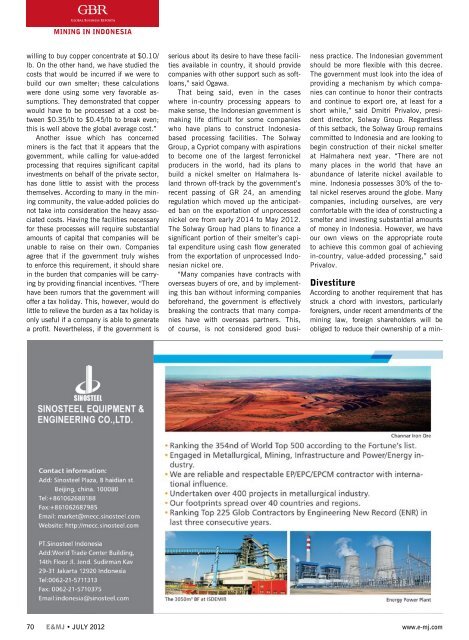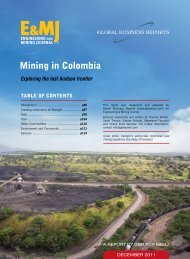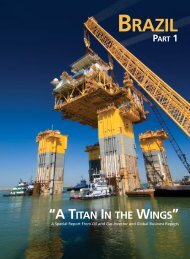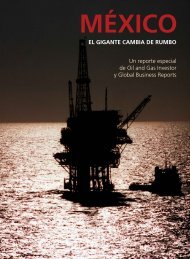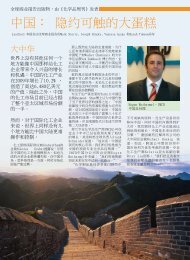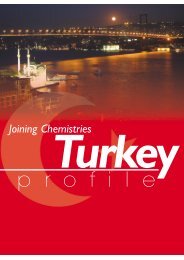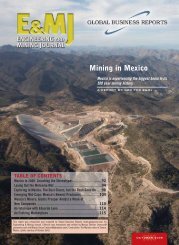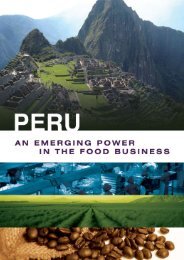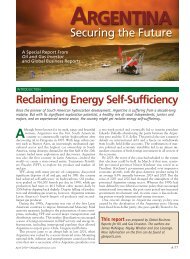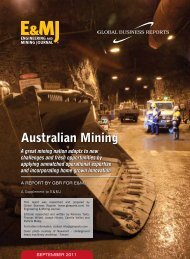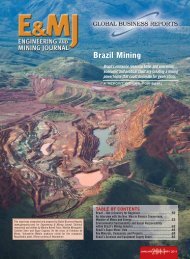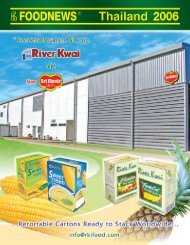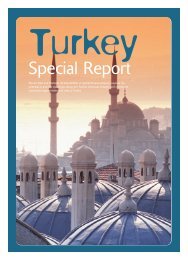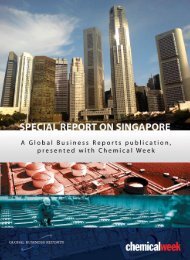Indonesia Mining 2012 - GBR
Indonesia Mining 2012 - GBR
Indonesia Mining 2012 - GBR
Create successful ePaper yourself
Turn your PDF publications into a flip-book with our unique Google optimized e-Paper software.
<strong>Mining</strong> IN <strong>Indonesia</strong><br />
willing to buy copper concentrate at $0.10/<br />
lb. On the other hand, we have studied the<br />
costs that would be incurred if we were to<br />
build our own smelter; these calculations<br />
were done using some very favorable assumptions.<br />
They demonstrated that copper<br />
would have to be processed at a cost between<br />
$0.35/lb to $0.45/lb to break even;<br />
this is well above the global average cost.”<br />
Another issue which has concerned<br />
miners is the fact that it appears that the<br />
government, while calling for value-added<br />
processing that requires significant capital<br />
investments on behalf of the private sector,<br />
has done little to assist with the process<br />
themselves. According to many in the mining<br />
community, the value-added policies do<br />
not take into consideration the heavy associated<br />
costs. Having the facilities necessary<br />
for these processes will require substantial<br />
amounts of capital that companies will be<br />
unable to raise on their own. Companies<br />
agree that if the government truly wishes<br />
to enforce this requirement, it should share<br />
in the burden that companies will be carrying<br />
by providing financial incentives. “There<br />
have been rumors that the government will<br />
offer a tax holiday. This, however, would do<br />
little to relieve the burden as a tax holiday is<br />
only useful if a company is able to generate<br />
a profit. Nevertheless, if the government is<br />
serious about its desire to have these facilities<br />
available in country, it should provide<br />
companies with other support such as softloans,”<br />
said Ogawa.<br />
That being said, even in the cases<br />
where in-country processing appears to<br />
make sense, the <strong>Indonesia</strong>n government is<br />
making life difficult for some companies<br />
who have plans to construct <strong>Indonesia</strong>based<br />
processing facilities. The Solway<br />
Group, a Cypriot company with aspirations<br />
to become one of the largest ferronickel<br />
producers in the world, had its plans to<br />
build a nickel smelter on Halmahera Island<br />
thrown off-track by the government’s<br />
recent passing of GR 24, an amending<br />
regulation which moved up the anticipated<br />
ban on the exportation of unprocessed<br />
nickel ore from early 2014 to May <strong>2012</strong>.<br />
The Solway Group had plans to finance a<br />
significant portion of their smelter’s capital<br />
expenditure using cash flow generated<br />
from the exportation of unprocessed <strong>Indonesia</strong>n<br />
nickel ore.<br />
“Many companies have contracts with<br />
overseas buyers of ore, and by implementing<br />
this ban without informing companies<br />
beforehand, the government is effectively<br />
breaking the contracts that many companies<br />
have with overseas partners. This,<br />
of course, is not considered good business<br />
practice. The <strong>Indonesia</strong>n government<br />
should be more flexible with this decree.<br />
The government must look into the idea of<br />
providing a mechanism by which companies<br />
can continue to honor their contracts<br />
and continue to export ore, at least for a<br />
short while,” said Dmitri Privalov, president<br />
director, Solway Group. Regardless<br />
of this setback, the Solway Group remains<br />
committed to <strong>Indonesia</strong> and are looking to<br />
begin construction of their nickel smelter<br />
at Halmahera next year. “There are not<br />
many places in the world that have an<br />
abundance of laterite nickel available to<br />
mine. <strong>Indonesia</strong> possesses 30% of the total<br />
nickel reserves around the globe. Many<br />
companies, including ourselves, are very<br />
comfortable with the idea of constructing a<br />
smelter and investing substantial amounts<br />
of money in <strong>Indonesia</strong>. However, we have<br />
our own views on the appropriate route<br />
to achieve this common goal of achieving<br />
in-country, value-added processing,” said<br />
Privalov.<br />
Divestiture<br />
According to another requirement that has<br />
struck a chord with investors, particularly<br />
foreigners, under recent amendments of the<br />
mining law, foreign shareholders will be<br />
obliged to reduce their ownership of a min-<br />
70 E&MJ • JULY <strong>2012</strong> www.e-mj.com


